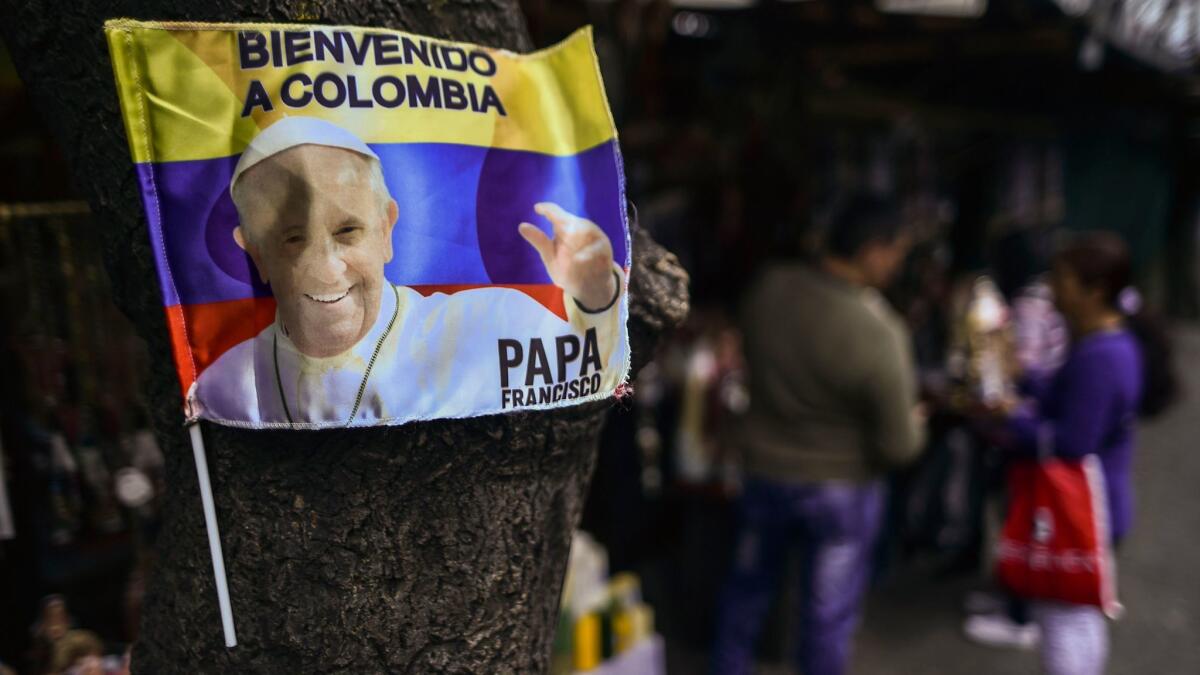Pope Francis, headed to Colombia, will promote peace accord government signed with FARC rebels

- Share via
Reporting from BOGOTA, Colombia — Pope Francis was scheduled to arrive in Colombia on Wednesday to urge reconciliation in a country deeply divided over the terms of a peace deal that the pontiff helped bring to fruition.
The five-day visit — the first time a pope has traveled here since John Paul II came in 1986 — comes nine months after the deal ended 52 years of civil war between the government and the leftist Revolutionary Armed Forces of Colombia, or FARC.
Francis closely followed the negotiations and publicly pushed both sides toward the agreement, making at least two phone calls to President Juan Manuel Santos, who was awarded the Nobel Peace Prize for his efforts.
Francis “gave us encouragement at difficult moments,” Santos said last week in downtown Bogota at the premiere of a government-sponsored documentary chronicling the four years of negotiations in Havana. “He was always present, sending us positive messages.”
But for all the hopes the peace deal has raised for social and economic progress, it faces considerable opposition. Voters rejected the accord in a referendum last fall only to see Santos push it through Congress anyway.
Critics led by former President Alvaro Uribe, who is now a senator, believe that it let the rebels off too easy for horrendous crimes including killings, kidnappings and extortion.
Many Colombians also oppose provisions that guarantee the former rebels representation in Congress and billions of dollars in aid at a time when the government is raising taxes and cutting social spending in response to plunging oil and coal prices that have hurt the economy.
“I’m all for the pope’s visit and reconciliation but the rebels are getting too much money,” said Carla Suarez, a physical therapist in Bogota. “That’s why I’m against the peace agreement.”
Experts said that the pope’s visit to Colombia is a sign of his commitment to seeing the accords fully implemented.
“Usually he visits more than one country at a time so it’s significant he’s spending so much time there,” said Peter Casarella, a theology professor at the University of Notre Dame. “He wants to show his solidarity with Colombians of all political persuasions and to the peace process which is underway.”
The pope tried and failed in December to broker reconciliation between Santos and Uribe, who have become bitter enemies. Last week, Uribe and his congressional faction declined an invitation from Santos to join other legislators in meeting with the pope Thursday at the presidential palace in Bogota.
The peace deal also faces opposition from the pope’s ranks.
Fernan Gonzalez, a Jesuit priest and historian with CINEP, a faith-based social justice foundation in Bogota, said that one of the pope’s top priorities for the trip is to bring Colombia’s 80 bishops and other clergy together behind the peace deal in hopes that their influence in the heavily Catholic country will lead to wider public acceptance of the deal.
“The pope is closely tied to the theme of peace and reconciliation but he is walking a tightrope coming to Colombia at a moment of intense polarization,” Gonzalez said. “There is resistance to the peace accord in many sectors, in the population generally but also among the clergy. So it’s difficult to anticipate what the pope might say in this confused environment without creating some problems.”
The Vatican has tried to emphasize the visit’s pastoral purpose, saying the pope will stress reconciliation and won’t endorse specific peace deal provisions.
“He has to stand above the fray,” said Douglass Cassel, a Notre Dame law professor who was an advisor to the Colombian government during the Havana talks and helped draft the transitional justice portions of the agreement.
But the perception of the trip as a gesture to support the peace process is hard to avoid. During a visit to the city of Villavicencio, he will beatify two Colombian priests, Bishop Jesus Jaramillo and Father Pedro Ramirez, who were killed during Colombia’s decades-long civil conflicts.
The pontiff has not shied away from political controversy in the pursuit of peace. He played an important role in the restoration of diplomatic relations between the U.S. and Cuba in 2015 as well as a truce between gangs and the government in El Salvador the following year, said Evan Berry, an American University professor who specializes in religion and international affairs.
Francis has also tried, unsuccessfully, to foster dialogue between the government and the opposition in Venezuela, Berry said.
The pope will arrive to some recent good news in Colombia’s push for peace. On Monday, government negotiators announced that Colombia’s last significant rebel group, the National Liberation Army, which is much smaller than the FARC, had agreed to a three-month cease-fire starting in October.
A similar cease-fire declared by the government and the FARC in July 2016 was a pivotal step in the peace deal finalized in December.
Colombia, which ranks behind only Brazil and Mexico among Latin American nations with the most Roman Catholics, is the fifth Latin American nation Francis is visiting since becoming pope in 2013. Roughly three-quarters of Colombia’s 48 million citizens describe themselves as members of the church.
The visit by Francis is generating enormous interest, with more than 4 million faithful expected to see him, including 700,000 at an outdoor Mass in Bogota’s Simon Bolivar Park on Thursday and an even bigger crowd at Medellin’s Olaya Herrera international airport on Saturday.
Casarella said the pope will emphasize a specific theme at each of his four stops: peace and reconciliation in Bogota, victims and environmental rights in Villavicencio, religious vocations in Medellin and the church’s mission to the poor in Cartagena.
Kraul is a special correspondent.
More to Read
Sign up for Essential California
The most important California stories and recommendations in your inbox every morning.
You may occasionally receive promotional content from the Los Angeles Times.













